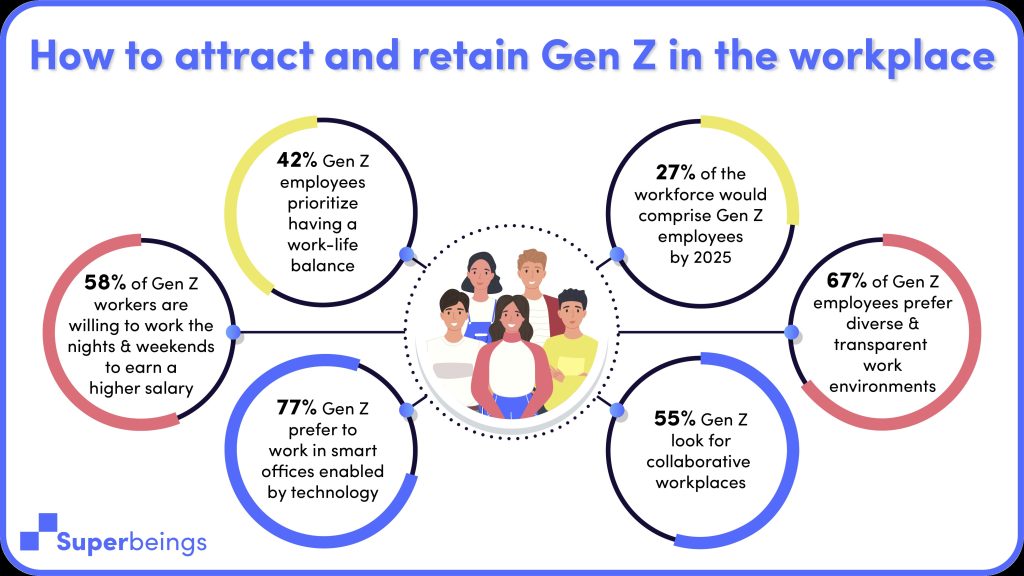Gen Z is on its way to becoming the most populous generation on the planet. It is anticipated that by 2025, 27% of the workforce would comprise Gen Z employees. No wonder, they are soon going to be the most diverse generation in the workplace as well, surpassing millennials.
First, let’s understand how is Gen Z in the workplace
Generation Z has started entering the world of work with new expectations and are fundamentally very different from the previous generations. They are value-based and driven by personal outlook. They do not believe in just blindly following a linear pattern, rather want to work in more dynamic environments.
They look for diversity, equity, and inclusion in their workplaces. 67% of the Gen Z workers expressed that they would look for a workplace that emphasizes a diverse and transparent environment in recruitment materials.
Organizations are now required to come up with new ways to include Gen Z with them, make a deliberate effort to emphasize their efforts to be diverse global leaders and provide meaningful work opportunities across all segments.
How are they different from Millennials?
It is easy to confuse millennials with Gen Z. But there are some clear distinctions that employers can leverage on –
Also Read: Tips for making a successful entrepreneurship journey : Sabyasachi Dutta
- Financial security
Despite being termed as unmotivated, lazy, and illogical by the previous generations, Gen Z workers are willing to work hard to gain the economic security that they want. 58% of Gen Z workers are willing to work the nights and weekends to earn a higher salary. Moreover, they are also keen on developing multiple streams of income to keep the money flowing under all circumstances.
- Self-learners vs institutional learning
The learning journey for Gen Zs has been thrown into confusion and disorder. The schools could not keep up with them, so they turned towards learning from their independent works and online resources. This also makes it difficult for them to blend themselves with older generations when they enter the corporate world.

- Entrepreneurial
As it has been already established that Gen Z’s learning journey has never been linear. This is why they also have different attitudes and approaches towards their career choices compared to Gen X or millennials — turning them into natural entrepreneurs.
This satisfies their need for flexibility, autonomy, continuous learning and creativity. As entrepreneurs who are equipped with tech knowledge, they have been revolutionizing processes and traditional ways of doing things.
- Flexibility — Gig economy members
Those who aren’t entrepreneurs, are turning into solopreneurs — instead of full-time jobs, they rely more on working as freelancers and taking up specific skill-based time-bound projects or gigs that build their portfolio.
Moreover, even full-time Gen Z employees are looking for workplace flexibility that gives them the space to work on their own accord and deliver their best performance.
Finally, Gen Z employees are less driven by brand and employer reputation. Instead they look for meaningful opportunities and personal development through their work.
6 ways to attract and retain Gen Z in the workplace
Employers need to be creative even with their talent management practices while dealing with Gen Z –
- Innovative recruitment
Since they are entering the workforce at a time of talent insufficiency, they have demands for personal communication, and a high-tech hiring process.
Employers may use methods such as customizing the communication strategies, forming a referral network for hiring, doubling down on-campus recruitment, using creative and highly defined job descriptions to attract Gen Z workers, and enhancing the Career page of the organization.
- Better work-life balance
42% of Gen Z employees have their top priorities on having a balanced work-life, flexible and hybrid working, and mental health and wellbeing. While previously these priorities were usually high salaries and bonuses, they have now been replaced with the freedom to work on one’s own terms.
- Smart offices
Growing up with technology, Gen Z has the habit of personalizing everything in their lives, so it is natural for them to look for a personalized employee experience in the new and smart offices.
The demand for personalization and convenience in the workplace are satisfied by smart office technology. 77% of Gen Z surveyed said they expect to work in an organization that offered various workplace technologies, such as smart meeting rooms, and AI-powered meeting management
- Authentic communication
As much as the young talents rely on online or digital communication, they also highly support face-to-face communication. Constantly receiving emails or texts can also become overwhelming, due to which four out of ten employees prefer having a 1:1 conversation with managers and team meetings.
- Role clarity
Gen Z prefers to have meaningful work — they want to know how their work impacts the bottom line business performance. Their demand for clear, specific, transparent and aligned goals is driving employers to integrate SMART goals with OKR frameworks.
- Continuous feedback for continuous learning
Gen Z does not see annual reviews as a functional way of receiving feedback as it has many variables that do not align with their form of communication. Instead, they believe in forming a continuous chain of feedback so they keep learning and improving continuously.
Growing up with various social media platforms powered by technology, Gen Z likes to communicate their opinions constantly. Forming a 360-degree feedback system would help employers all over the world retain young and up-coming talent in their organization.























Add comment